democracynow.org
Stories:

Vice President's Daughter Karenna Gore Arrested in the Trenches of a Climate Protest
We turn now to an act of civil disobedience on climate change in the West Roxbury neighborhood of Boston. On Wednesday, a dozen protesters with the group Resist the Pipeline were arrested for nonviolently lying down in a trench being dug by Spectra Energy for its pipeline. Several more were arrested for trespassing on private property. The action sought to draw a connection between pipelines like Spectra’s and a mass grave that was dug last month in Pakistan in preparation for a deadly heat wave. For more, we speak with Karenna Gore, director of the Center for Earth Ethics at Union Theological Seminary.
TRANSCRIPT
This is a rush transcript. Copy may not be in its final form.
AMY GOODMAN: We end today’s show in Boston, where Karenna Gore, the daughter of Vice President Al Gore, was arrested along with 22 others, including many clergy, while protesting the construction of a Spectra Energy pipeline in West Roxbury to carry fracked gas. Twelve of the protesters, including Gore, climbed inside the pipeline trench and refused to budge for almost two hours before being forcibly removed by firefighters. The protesters drew a comparison to the mass graves dug in Pakistan in anticipation of a climate-fueled heat wave in May. Climate activist Tim DeChristopher spoke before the action.
Tim DeChristopher: "This new age that we are entering, this age of anticipatory mass graves, requires something new of us, requires that we no longer pretend that things are OK. It requires that we no longer act like we can just turn away from what’s happening in other places in the world. And it requires that we can no longer pretend like what Spectra is doing here in West Roxbury is anything other than digging a mass grave.
AMY GOODMAN: For more, we go to Boston, Massachusetts, where we’re joined by two guests who nonviolently occupied the pipeline and were arrested Wednesday. Yes, Karenna Gore is with us, director of the Center of Earth Ethics at Union Theological Seminary here in New York. And Tim DeChristopher joins us, climate activist, founder of the Climate Disobedience Center. He spent 21 months in federal custody for posing as a bidder in 2008 to prevent oil and gas drilling on thousands of acres of public land in his home state of Utah. He’s the subject of the documentary Bidder 70.
Karenna Gore and Tim DeChristoper, welcome to Democracy Now! Karenna, why were you arrested yesterday?
KARENNA GORE: I was very proud to be a part of a group that included a lot of local clergy here in the West Roxbury area, in the Boston area. And we were arrested because the laws and policies regarding climate change are so out of step with what is required to meet this challenge. And we wanted to, in the tradition of nonviolent civil disobedience, draw attention and call for what—to do the right thing.
AMY GOODMAN: Explain what this pipeline does, where it goes from, where it is headed to, and what’s supposed to be in it.
KARENNA GORE: Well, it will carry—it would carry fracked gas. And it is the lateral section of a Spectra pipeline that is part of the Spectra A-I-M—AIM—pipeline system. I was previously a part of an effort to stop the Constitution pipeline in New York state, and that was originally my entry point into learning more about these pipelines and where they’re going in all across the Eastern Seaboard.
AMY GOODMAN: You’ve been involved with other of these protests, Karenna?
KARENNA GORE: I have not been involved in nonviolent civil disobedience before now. I’m one of many people who is seeing a need to step up into that arena in that way.
AMY GOODMAN: And so, how did it feel to be arrested? And describe what exactly you did going into the trench yesterday in West Roxbury.
KARENNA GORE: Well, what we did was we went in, in a nonviolent and peaceful way, and the intention is to stop work on this pipeline. By the way, the city of Boston is litigating against this pipeline. This is an area where there is an overreach of federal power against the will of a local community. Every elected official in that neighborhood is against this pipeline. We were standing with the people who are objecting, not only because of climate change impacts, but also because of concern for their own communities. And so, what happened was we were asked whether or not we would walk out voluntarily, and several of us said, "No, we’re staying here because our intention is to stop construction of this pipeline." And at that point, when the firefighters arrived, we, of course, complied with what they needed to do to remove us from the trench.
AMY GOODMAN: You’re the director for the Center of Earth Ethics at Union Theological Seminary. What role did clergy play yesterday?
KARENNA GORE: The clergy there, including Rabbi Shoshana Feinberg—
TIM DECHRISTOPHER: Friedberg.
KARENNA GORE: Friedberg.
TIM DECHRISTOPHER: Friedman, Friedman.
KARENNA GORE: Friedman, sorry—Reverend Mariama White-Hammond, well, many, actually, diverse clergy, they gave eulogies, drawing the connection—it’s really time, we feel, to connect the dots between our energy policies, our systems, building more fossil fuel infrastructure in this country, and the climate change impacts that are already here, that are hurting the most vulnerable people in the world. And so they gave those eulogies, making those points. Reverend Mariama White-Hammond said that this was a time to remember Reverend Martin Luther King and what he had to say when he entered into the debate to end the Vietnam war, the role that nonviolent civil disobedience played in the civil rights movement. There was a lot of invoking of right and wrong, what is moral here, and how can we, as very concerned citizens, exercise our voice.
AMY GOODMAN: Karenna Gore, what did your father say? In 2008, he said, "If you’re a young person looking at the future of this planet and looking at what is being done, and not done, I believe we have reached the stage where it is time for civil disobedience."
KARENNA GORE: Yes, he’s very supportive, not only of me, but of all of the activists that are putting their bodies on the line and saying that we really need to—we need to shake up the system. It’s not working. There are too many elected officials who take so much money from fossil fuel interests, and that’s why the laws and policies aren’t changing. So we have all the information we need. Now what we need to do is really press for action. ... Read More →

Report from Istanbul: Uptick in Bombings Comes as Turkey Drifts Toward Islamist, Authoritarian Rule
Funerals have begun in Turkey for some of the 42 people killed in a triple suicide bombing Tuesday targeting Turkey’s main airport in Istanbul. The attack also left 239 others injured. Authorities said three attackers arrived at the airport’s international terminal by taxi and blew themselves up after opening fire. The airport is the 11th busiest in the world. No group claimed responsibility for the attack, but Turkey’s prime minister said the initial probe pointed to the self-proclaimed Islamic State, or Daesh. A senior Turkish official told the Associated Press the three suicide attackers were nationals of Russia, Uzbekistan and Kyrgyzstan. Earlier today, Turkish police raided 16 locations in Istanbul and detained 13 people on suspicion of involvement in the attack. Turkey has seen an uptick in bombings since last year, when the United States began using Turkey’s Incirlik Air Base to carry out bombing raids in Syria and Iraq targeting ISIS strongholds. We speak to Koray Çaliskan, associate professor of political science at Bogaziçi University in Istanbul.
TRANSCRIPT
This is a rush transcript. Copy may not be in its final form.
AMY GOODMAN: Funerals have begun in Turkey for some of the 42 people killed in the triple suicide bombing Tuesday targeting Turkey’s main international airport in Istanbul. The attack injured more than 230 people. Authorities said three attackers arrived at the airport’s international terminal by taxi and blew themselves up after opening fire. The airport is the 11th busiest in the world. No group has claimed responsibility for the attack, but Turkey’s prime minister said the initial probe pointed to the self-proclaimed Islamic State, or Daesh. A senior Turkish official told the Associated Press the three suicide attackers were nationals of Russia, Uzbekistan and Kyrgyzstan. Earlier today, Turkish police raided 16 locations in Istanbul and detained 13 people on suspicion of involvement in the attack.
Turkey has seen an uptick in bombings since last year, when the United States began using Turkey’s Incirlik Air Base to carry out bombing raids in Syria and Iraq targeting ISIS strongholds. Tuesday’s attack came just one day after Turkey restored diplomatic ties with Israel after a six-year rupture.
On Wednesday, I got in touch with Koray Çaliskan, associate professor of political science at Bogaziçi University in Istanbul. We reached him at his home by Democracy Now! video stream and asked him to respond to the attack.
KORAY ÇALISKAN: It’s really sad that this happened. We know that there is a threat of international terrorism, but unfortunately this threat got materialized more in Turkey. In the last 12 months, we saw 17 bombings that costed the lives of 294 people, wounded 1,009. Not even a single official left office, resigned. And the Islamist authoritarian AKP government did not accept that there was a security breach in Turkey.
Remember that these three ISIS terrorists entered Istanbul airport passing a security check with hand grenades, AK guns, Glock guns, and then they entered the airport building after the first security check and began to shoot at people during and after the second check. This is a great problem, and I believe, because Erdogan decided to be a president in a presidential system—as you know, Turkey is a parliamentary regime—they have not been working well to take care of security measures and also take aim at the heart of terrorist organizations.
One of the most important sources for open source security and intel, intelligence, is Twitter and Facebook and internet correspondence, right? In Turkey, Twitter is blocked right now. Facebook is blocked. We can’t talk to each other through Twitter. We can’t talk to each other through Facebook. Why? Because the government and Erdogan himself do not want people to criticize them, criticize their weakness.
I’ll give you another example. We had another unfortunate bombing in Brussels a few months ago, you would remember. It took Belgian authorities to open the airport six days, because they studied every security breach in that airport and fixed them and opened the airport. Six weeks—six days, excuse me. In Turkey last night, only six hours after the bombing, despite the unacceptable security breach in the gates of the airport, the government decided to open the airport. It costed 41 lives. Not even a single elected official resigned or forced to resign.
Nothing really works in this country. The economy is going bad. Democracy, we lost it. Technically, Turkey is a competitive authoritarian regime ruled by Islamists, authoritarian Islamists. In terms of security, you see what’s going on. No one really feels secure in this country anymore. And because of the Kurdish question and the increasing terrorist activities of PKK, the government doesn’t know what to do, other than bombing people, other than using military means, other than shutting down Twitter, other than doing what authoritarian leaders do, from North Korea to Syria, from Russia to Turkey.
AMY GOODMAN: What about the warnings, Professor Çaliskan, the warnings that had come in a few weeks ago of something like 30 or so ISIS fighters coming over the border from Syria? The Turkish government very much understood this, the possibility of an attack during Ramadan, and especially in these last days when people are traveling.
KORAY ÇALISKAN: There has been intelligence about it. And, unfortunately, we hear about intelligence regarding what’s going to happen in Turkey from either U.S. Embassy or French Embassy or German Embassy. Our government doesn’t tell us anything about it. The U.S. told about possibility of bombings and that there has been—there have been close to 30 terrorists entering Turkey, planning attacks. We didn’t hear anything from our government.
This happened before. The last bombing in Istanbul was in Istiklal Street, very close to Gezi Park. And German Embassy asked German schools to be emptied, told their citizens to not to go to Istiklal Avenue and around it. Less than 24 hours later, we had a bombing in Istiklal Avenue. Our government didn’t tell anything, because, first, in their mind, if they warn people, they think that people will think that they are not doing their job properly. But on the contrary, if they warn us, if they take intelligence seriously, we would think that they are doing their job. Right now, no one really thinks that they are doing their job. They are just shouting at journalists, academics, intellectuals, for criticizing them.
AMY GOODMAN: I wanted to ask you again about the timing. On Monday, Israeli Prime Minister Benjamin Netanyahu announced a restoration of ties with Turkey, including increased cooperation in oil and gas production. This is what he said.
PRIME MINISTER BENJAMIN NETANYAHU: [translated] Israel has reached an agreement of a strategic significance to the state of Israel, to security, to regional stability and the Israeli economy. ... The gas field Leviathan can supply both the Egyptian market, which we intend to work with, but Leviathan can also supply the Turkish market and the supply of gas via Turkey to Europe. This is a strategic matter for the state of Israel. This matter could not have been advanced without this agreement, and now we will take action to advance it.
AMY GOODMAN: You have the re-establishment of ties between Turkey and Israel this week, and also Turkey seeing an uptick in bombings since last year, when the United States started using Turkey’s Incirlik Air Base to carry out bombing raids in Syria. Well, on Tuesday, Secretary of State John Kerry spoke after the deadly attack on the airport in Istanbul.
SECRETARY OF STATE JOHN KERRY: We are still collecting information and trying to ascertain what happened and who did it. And I won’t comment further on it, except to say that this is daily fare. And that’s why I say the first challenge we need to face is countering nonstate violent actors, for a host of reasons.
AMY GOODMAN: Professor Çaliskan, can you respond to both Kerry and also the re-establishment of ties with Israel, if you think these issues are related?
KORAY ÇALISKAN: I don’t think the bombing in Istanbul is related to Turkey’s establishing of the diplomatic relations with Israel and Kerry’s comments, for two reasons. First, you can’t—you don’t have time to respond that fast, if you’re a terrorist organization, two days after Israel and Turkey announced that. Two, in the last 12 months, there have been 17 bombings, Amy, in Turkey. You’re talking about one bombing, one terrorist attack, every three weeks. This is another threat. There is a war against Turkey that President Erdogan and the government of Islamist authoritarian AKP do not take seriously.
On the issue of rapprochement between Israel and Turkey, I think it is very sad that Turkey stepped back from its principles, its foreign policy principles. They said that they were against the blockade, the embargo of Palestinians, and they legitimized the blockade itself by agreeing to give the aid to Israel so that it can distribute the aid to any Palestinian anytime it wants. They got the money for the families of nine people the Israeli Defense Forces killed in international waters, thus violated international law. And Turkey accepted that they won’t be sued in Turkey or they won’t be taken to court in international justice system. This is a disgrace.
AMY GOODMAN: That was the Israeli military attack on the Mavi Marmara, that was trying attempt to break the blockade of Gaza.
KORAY ÇALISKAN: Yes. So, that’s why, for two reasons, they are not related. I believe what Erdogan is trying to do is that he realized that he has been making a lot of mistakes. Russian planes were bombing ISIS, and they downed a Russian plane, with no legitimate reason. And they had to apologize from Russia. And in Turkey, they say that they didn’t apologize; they just said they were sorry, as if that was a substantive difference. They are planning to pay for the downing of the plane, and they are planning to get the money from Israel.
I don’t really understand what principles are changing here. On the one hand, they are criticizing the military coup d’état in Egypt; on the other hand, they are willing to make peace with them. On the one hand, they pretend as if they have principles; on the other hand, they do their best to violate those principles. I think they are losing control of foreign and domestic policy because of one reason: Erdogan’s dream of becoming a president of a presidential system.
AMY GOODMAN: Professor, earlier this year, more than a thousand Turkish academics signed a peace petition. Several of them were jailed. Can you talk about Erdogan government’s reaction to dissenting voice and how that relates to the climate of terror in Turkey right now?
KORAY ÇALISKAN: Of course. I signed that letter, too. First, it was signed by more than 1,200 academics. When Erdogan called us terrorists or voices of terror, 1,000 more academics signed it. Since then, more than 100 academics lost their jobs. They were fired from public and private universities. Four academics were jailed for more than a month; they are free right now. And many academics are being prosecuted, just because they criticized AKP’s handling of Kurdish question. This is another move of Erdogan to silence civil society in the country. He silenced the media. The most important editor-in-chief in the country, Can Dündar, was about to be killed, less than two months ago, after Erdogan targeted him. A fascist just began shooting at him, and the journalist’s wife prevented him from taking aim at Can Dündar. So the press is being silenced. The academics are being silenced. How can academics, who have PhDs from states, Europe, Turkey, accept to be terrorists? What Erdogan does is to do what all authoritarians do: If there is—if he is being criticized and if he doesn’t agree with academics or journalists, he accuses them of being with terrorists.
He has another strategy in addition to that. When you criticize him, he considers it as an insult or libel against the president. I have a court case. My next hearing will be in September. And I—the prosecutor general wants me to be jailed by eight years, three months for writing a tweet criticizing Erdogan. And the tweet didn’t even mention his name. So, imagine, there are hundreds of court cases like this. He is winning them. He is making money out of them. People are being in jail.
But what we see, unfortunately, is the following: Turkey is leaving democracy, and United States is just watching it. You cannot have a secure world with authoritarian leaders. Remember what happened in Cold War: We were at the brink of a nuclear war. And right now, world democracy is being threatened by poverty, mostly organized by capitalism, and by terrorism, mostly organized by organizations like ISIS. There is only one way to deal with this double threat: democracy now.
AMY GOODMAN: Are you afraid to be making comments like that, speaking to us from Istanbul, where you teach?
KORAY ÇALISKAN: I’m not afraid, because my job is to tell the truth. I don’t tell the truth, I don’t do my job. How am I going to explain this to my children and to my students in the future? Am I afraid? I think right now intellectuals in Turkey are not afraid. They are concerned about their colleagues. They are concerned about Turkish democracy. But we will continue to tell the story of democracy, freedom, equality and liberty.
AMY GOODMAN: Koray Çaliskan, associate professor of political science at Bogaziçi University in Istanbul, Turkey. We were speaking to him at his home.
When we come back, we go to the home of Wayne Barrett in Brooklyn, New York. He has been following Donald Trump as an investigative reporter for decades. Stay with us. ... Read More →

"A Classic State Capitalist": How Donald Trump Profited from Public Subsidies & Political Favors
It’s not been easy for me. It has not been easy for me. I started off in Brooklyn. My father gave me a small loan of a million dollars." Those were the words of presumptive Republican nominee Donald Trump during a town hall event last year in New Hampshire. Today we look back at Trump’s rise to power and how he profited from his father’s deep pocketbook and political connections. Decades before Donald Trump became a household name, his father Fred Trump emerged as one of New York’s most prolific real estate developers, building more than 27,000 homes in Brooklyn and Queens. In 1927, Fred Trump made the news when he was arrested at a Ku Klux Klan riot in Queens. We speak to Wayne Barrett, considered the preeminent journalist on Donald Trump. As a reporter at The Village Voice, Barrett began reporting on Donald Trump in the late 1970s. Barrett’s 1991 biography of Trump was just republished as an ebook with the title of "Trump: The Greatest Show on Earth: The Deals, the Downfall, the Reinvention."
TRANSCRIPT
This is a rush transcript. Copy may not be in its final form.
AMY GOODMAN: We turn now to Donald Trump.
DONALD TRUMP: It’s not been easy for me. It has not been easy for me. And, you know, I started off in Brooklyn. My father gave me a small loan of a million dollars. I came into Manhattan. And I had to pay him back, and I had to pay him with interest. But I came into Manhattan. I started buying up properties, and I did great. And then I built the Grand Hyatt, and I got involved with the convention—so, I did a good job. But I was always told that that would never work. Even my father, he said, "You don’t want to go to Manhattan. That’s not our territory," because he was from Brooklyn and Queens, where we did, you know, smaller things. And he said, "Don’t go to Manhattan. That’s not our territory." But he was very proud of me. But all my life, I was told no.
AMY GOODMAN: Those were the words of presumptive Republican presidential nominee Donald Trump during a town hall event last year in New Hampshire. Well, today we look back at Trump’s rise to power and how he profited from his father’s deep pocketbook and political connections. Decades before Donald Trump became a household name, his father Fred Trump emerged as one of New York’s most prolific real estate developers, building more than 27,000 homes in Brooklyn and Queens. In 1927, Fred Trump made news when he was arrested at a Ku Klux Klan riot in Queens.
Earlier this week, Democracy Now!'s Juan González and I spoke with Wayne Barrett, considered the preeminent journalist on Donald Trump. As a reporter at The Village Voice, Barrett began reporting on Donald Trump in the late ’70s. Barrett's 1991 biography of Donald Trump was just republished as an ebook with the title Trump: The Greatest Show on Earth: The Deals, the Downfall, the Reinvention. We spoke to Wayne Barrett at his home in Brooklyn, where he has largely been confined due to his battle with lung cancer. I began by asking Wayne Barrett why he’s tracked Donald Trump for so long.
WAYNE BARRETT: When I started, in the '70s, he was this golden boy, you know, and he had not had much press, but it had all been very supportive, because he was doing the Grand Hyatt, which was his first big project in Manhattan. And the city was down in the dumps, you know, near broke during the ’70s, and he looked like the embodiment of a rising city. And he was getting that kind of press, though not much of it. And I was at The Village Voice, and so I took on—I was a rookie, he was a rookie. We're about the same age; I’m a little older. And so, I took on this whole notion of, well, let’s take a look at this guy who appears to be the answer to the city’s very grave financial problems at the time. And I started working on him in the maybe '77 period. I worked on him intensely in ’78 while the Hyatt was under construction, had not completed yet. And that's when I first got to know him. And I did about 10 hours of taped interviews with him as a young guy and wrote a two-part series that led to the impaneling of a federal grand jury, actually, because he was engaged in all kinds of machinations, even as a rookie. I mean, he started out playing games. So, there was a federal grand jury here in the Eastern District in Brooklyn, that did not lead to an indictment, but may have been the toughest ride he’s ever had, really, with a prosecutor.
JUAN GONZÁLEZ: One of the points that you made in the original book was the amount of—he has always projected himself as a self-made millionaire and then billionaire, but the amount of support he got from his father, also a real estate developer, and that his father was really crucial to his rise.
WAYNE BARRETT: Unbelievably crucial. When he opened his first office in Manhattan, the rent was paid by his father’s company out here on Avenue Z in Brooklyn. And everything that he did, whether it be the Grand Hyatt—the Grand Hyatt, for example, to get the financing, he got the financing from two banks that his father had used, used his father’s relationship banker. And the father had to sign the financing agreements. I mean, they’re not going to give a 30-year-old kid $35 million in 1978 to build a hotel. It has to be done with Fred’s resources. And Fred Trump was a great outer borough builder and really built good housing, 20,000 units totally, all over Queens, all over Brooklyn, some of them towers, like Trump Village, many of them single-family homes, that he had a great reputation as a builder. He was politically wired, as his son was. I mean, they played the political game, both of them, expertly, but Fred Trump was indispensable. I mean, even Trump Tower, which comes along later in Donald’s career, could not have been done without Fred coming in and supporting the financing of it. When he opened his first casino in Atlantic City, when he bought the first properties, the lease holds for the first properties for Trump Plaza, his casino in Atlantic City, Fred rode down in the limo with him and signed all the lease hold documents. Nobody was going to be financing this kid developer, kid casino operator. It was Fred who was the key to all of it.
It’s so ridiculous for him to call himself a self-made guy, when Fred was critical at the political end, too. I mean, everything that came to Donald came through political connections. And they were political connections forged by his father over decades with Brooklyn politicians. He came from the same political club as the then-mayor of New York, Abe Beame. And when they—he had to get an option for the Grand Hyatt and for the West Side Yards from a bankrupt railroad in Philadelphia, Penn Central, and the people who were selling the assets of the bankrupt railroad wanted to make sure that the option that they gave, they were giving it to a developer who would actually develop, because that’s when the real payment comes to the railroad. And so, they came up from Philadelphia, and Fred Trump greets them. And Fred and Donald get them in a limo and take them down to City Hall, and there’s Abe Beame standing on the steps of City Hall. "Anything you want, we’ll give you." So this totally a byproduct of Fred’s relationship.
JUAN GONZÁLEZ: I wanted to ask you—in the book, you refer to both of them, both Fred and Donald, as state capitalists.
WAYNE BARRETT: Yeah.
JUAN GONZÁLEZ: And you talk about the political connections and the degree to which they depended on government officials or politically connected leaders, to build their empire.
WAYNE BARRETT: Yeah. Well, that’s the irony of his current run. I interviewed a guy named Joe Sharkey for the book. And this is not actually in the book, because I’m not in the book, but—so I don’t tell this tale. But Sharkey was the county leader of the Brooklyn Democratic Party years ago. And I interviewed him. He was in his eighties and a little hard of hearing. And I said to him, "When did you first see Fred Trump at the FHA?" The FHA, the Federal Housing Administration, had financed virtually everything that Fred Trump ever built in the early phase of his career. He later latched onto Mitchell-Lama, which, you know well, is a state subsidy program similar to FHA. And so I said to—I said to him, "When did you first see Fred at the FHA?" And he said, "I went down to Roosevelt’s inaugural. And then, after the inaugural, I went over to the FHA, and Fred was already there." And so, these guys were living at the trough, you know? They’d been living at the trough their whole lives.
AMY GOODMAN: Explain what you mean by that.
WAYNE BARRETT: Well, you know, everything that they’ve done was based on political connections and associations. Fred had them unbelievably. Bunny Lindenbaum was his lawyer. Bunny Lindenbaum was the most wired lawyer in New York. He actually had a locker in the basement of City Hall, where he would keep a bottle. And if it was an overnight Board of Estimate meeting, which was then the governing body of the City of New York where they made all the big zoning decisions and dispositions of city property and all that, he kept a bottle in the locker.
AMY GOODMAN: And the FHA and the Mitchell-Lama were subsidies of the housing?
WAYNE BARRETT: Subsidy programs, yeah. So these were the things that—you know, that Donald learned at the foot of the master. Fred was a master at this. You know, there were two different investigations—one by the State Investigations Commission of New York and one by Congress—of the FHA program, and Fred figured prominently in national scandals of the misuse of FHA funding. And he figured—he was the number one target of the State Investigations Commission for ripping off the Mitchell-Lama program here in New York. And so, they had a long history of this.
JUAN GONZÁLEZ: You also talk about the political leaders Donald Manes and Stanley Friedman and their role in the rise of Trump, as well.
WAYNE BARRETT: Yeah, well, Stanley Friedman became the boss of the Bronx. He was the first deputy mayor under Abe Beame. He was the one who did the legwork. Abe Beame said, "Anything you want, you got." Stanley Friedman, as the deputy mayor, shepherded, right to the last day—on the last day of the Beame administration, Stanley Friedman personally approved the award of the Garden Room, which hangs over 42nd Street, which was unprecedented at the time, that they would allow a major hotel to build something literally hanging over a street as prominent as 42nd Street—very controversial decision done on the final day of the administration. He walks out of the office that day, and the next week he starts at Roy Cohn’s law firm. And Roy was Donald’s attorney on the Grand Hyatt. And he goes right as a partner into Roy Cohn’s law firm. So, and Stanley Friedman ultimately is convicted by Rudy Giuliani, became the most powerful Democratic boss in the state of New York and did all kinds of things for Donald Trump. Yeah, so, Donald Manes was the Queens county leader and borough president, whose brother-in-law had a lighting company. When you look at Trump Tower every day on the national news, he did all the lighting in the lobby. Bill Warren is his name. That was the brother-in-law. He used to—Trump would stir up all kinds of business for Donald Manes’s brother-in-law. Manes winds up putting a kitchen knife through his chest, when Rudy Giuliani and the feds are after him, and killing himself. And these are the guys who were absolute linchpins to Donald Trump’s early career. They supported him at the Board of Estimate, approving all these projects.
AMY GOODMAN: Speaking of that unfortunate term "linchpin," what do you know of Fred Trump’s involvement with the Ku Klux Klan?
WAYNE BARRETT: Well, you know, I didn’t know about that at the time of the book. It’s not in the book. I’ve read about it since. I can’t understand how Donald Trump denies that this is true. There’s, I think, Washington Post clips—
AMY GOODMAN: The New York Times.
WAYNE BARRETT: —you know, which clearly say he was involved with the Ku Klux Klan. What I did write about in the book and what I actually wrote about at the Voice in the '70s was the race discrimination case that Richard Nixon's Justice Department brought against Fred and Donald Trump for racially excluding blacks and Latinos in a systematic way, with a color-coded system where if a black came in seeking an apartment, they got a certain color folder, where if a Latino came in, they got a different color folder, of where the application was put—the easiest way to exclude people. And, you know, the federal government established that during the course of protracted hearings. And ultimately, Fred and Donald settled the case.
And Donald does an affidavit in the case in which he claimed that he didn’t have anything to do with the actual rentals personally, actual rentals of the apartment. But I found, and wrote it in the Voice and then examined it a little bit more in the book, that he was simultaneously seeking a real estate broker’s license in New York state and that he had to file sworn statements. And then, in his sworn statements, he claimed he was in charge of all the rentals of the apartments. So, there was a sworn statement saying, from him, "I don’t have anything to do with it," and almost simultaneously a sworn statement saying, "I run it." You know, so the racial discrimination pattern at Fred Trump developments was really quite extraordinary.
AMY GOODMAN: He was found guilty?
WAYNE BARRETT: Well, it was—he signed a consent decree. This was a civil lawsuit, and he signed a consent decree. And he and Donald signed the consent decree. And then they violated it. They were not in compliance with it. And they had to go back, the feds did, in ’78 and do it again a second time.
JUAN GONZÁLEZ: Now, you talk about Trump Towers, in the new introduction to the book, as basically housing for a rogues’ gallery of felons—
WAYNE BARRETT: Yeah.
JUAN GONZÁLEZ: —that’s never been really touched upon. Could you expound on that?
WAYNE BARRETT: Well, you know, in the book itself, I added to the list that’s in the book. I have a couple dozen felons who wind up getting apartments in Trump Tower. In fact, one of the remarkable things about Donald is how he has avoided being indicted in the course of his career. One of the tales that I tell there involves a guy named Robert Hopkins, who was then running the biggest illegal gambling operation in the Bronx—and a client of Roy Cohn’s. He’s one of the early buyers, this guy Robert Hopkins, of an apartment in Trump Tower, paid about $2 million for it. And so, at the closing, Ted Teah, who you must remember, Juan—he was the City Planning Commission member from the Bronx appointed by Stanley Friedman, an associate in Roy Cohn’s law firm with Stanley Friedman, and he’s representing this guy Hopkins at the closing. And Hopkins is sitting there, with Trump in the room, mind you, with a briefcase filled with cash.
AMY GOODMAN: This is Donald Trump?
WAYNE BARRETT: Yes, counting the money out, hundreds of thousands of dollars, paying for the apartment in cash. And he had partial mortgages, which a guy named Robert Lamagra, a semi-wise guy kind of guy, who gets subsequently prosecuted in the Eastern District of New York—Hopkins was under indictment for murder of another mob guy, which that case wound up going nowhere, but he was convicted in other cases. And that’s just one of the many tenants that were drawn—it was like a magnet for bad guys, Trump Tower.
JUAN GONZÁLEZ: "Baby Doc" Duvalier?
WAYNE BARRETT: Yes, "Baby Doc" Duvalier is there. Yes, you’ve got—
AMY GOODMAN: While he was still in office in Haiti, the dictator?
WAYNE BARRETT: No—well, yes, he started this. That’s absolutely right. Yes, he was looking at it as a place to dump some of his booty from Haiti. He gets an apartment in there. And it’s just a long list, an incredibly long list. Joe Weichselbaum, who is an extraordinary side of Donald, he not only has an apartment in Trump Tower, he has one in Trump Plaza. And he’s like a several times convicted felon as a cocaine trafficker, and he flew Donald’s high rollers down to his casinos in Atlantic City. He’s got an apartment there. It’s just a laundry list of bad guys drawn to this—this temple of greed.
AMY GOODMAN: Investigative journalist Wayne Barrett wrote for The Village Voice for 37 years and continues to write as an independent reporter. His 1991 biography of Donald Trump was just republished as an ebook with the title Trump: The Greatest Show on Earth: The Deals, the Downfall, the Reinvention. We’ll continue with Part 2, 3 and 4 of our conversation with Wayne Barrett, who’s now confined to his home as he battles lung cancer, in the coming days on Democracy Now!, so do stay tuned.
When we come back, we’ll be joined by Karenna Gore, the daughter of former Vice President Al Gore. She was just arrested in Roxbury, Massachusetts, protesting against climate change. Stay with us.
[break]
AMY GOODMAN: "Old Man Trump" by Ryan Harvey, with Ani DiFranco and Tom Morello. The song was written, but never recorded, by Woody Guthrie, about his landlord, Donald Trump’s father Fred Trump. This is Democracy Now!, democracynow.org, The War and Peace Report. I’m Amy Goodman. ... Read More →

Tim DeChristopher Arrested Again in the "Age of Anticipatory Mass Graves" for Climate Victims
On Wednesday, 23 people were arrested protesting Spectra Energy’s fracked gas pipeline in West Roxbury, Massachusetts. Longtime climate activist Tim DeChristopher was one of about 30 people who ventured onto the Spectra pipeline construction site in an attempt to nonviolently stop work. Local residents and politicians have long opposed the West Roxbury Lateral pipeline, which they say is dangerous for the pipeline to run alongside a quarry where there is frequent blasting. During the action, DeChristopher and 11 others climbed inside the pipeline trench and refused to budge for almost two hours before being forcibly removed by firefighters. DeChristopher drew a comparison between the trenches of the gas pipeline and the mass graves recently dug in Pakistan in anticipation of a climate-fueled heat wave.
TRANSCRIPT
This is a rush transcript. Copy may not be in its final form.
AMY GOODMAN: Tim DeChristopher, you initiated this action. You gave this speech, an excerpt of which we just played, where you compared the trenches to the mass graves in Pakistan. Explain.
TIM DECHRISTOPHER: Yeah. You know, I mean, as you and, I think, probably a lot of your listeners know, I’ve been doing climate work for a long time and have been following a lot of the escalating disasters that we have been witnessing, and have spent a lot of time thinking about kind of where we’re headed, you know, and I consider myself pretty—pretty open to just the level of hardship and suffering that we’re moving towards. And yet, when I read that article last month about digging anticipatory mass graves in Pakistan, which, to my mind, is the first case of anticipatory mass graves, of just kind of accepting that, you know, we know we’re going to need mass graves, because we know we’ve entered this age where these disasters are going to happen. When I read that, it just—
AMY GOODMAN: Mass graves for people dying in heat waves?
TIM DECHRISTOPHER: Yes, and that just broke my heart in a whole new way, you know, after having it broken so many times from the news of climate change, and it just really weighed on me and wouldn’t let go. You know, it was one of those things that just settled deeply into my heart, and I felt really compelled to take action, connecting those dots, because when I looked at those pictures of this long mass grave trench that they’re digging in Pakistan, one of my first thoughts was, "My god, that looks exactly like what they’re digging in West Roxbury to lay a pipeline." And, of course, these things are connected, not just in their shape, but in one causing the other. And so, it felt something that was very personal and emotional for me. And even when I was giving that speech yesterday, I was getting very emotional. And, you know, in the workshops and trainings that I do with activists around the country, I always tell people that we’re at our most powerful when we’re sharing our deepest personal truth, that when we’re most authentic is when we’re most powerful. And this, for me, was something that—was something that I was genuinely torn up about, and so that’s why I felt so called for this to be my first civil disobedience action after I just got off probation a couple months ago.
AMY GOODMAN: After you served almost two years in prison, you just got off probation in April. Are you willing to go back to prison again?
TIM DECHRISTOPHER: Yes, I am. You know, I don’t know how likely that is in this case. We did get charged with a few charges, including resisting arrest. But, you know, at this point, there’s been almost 150 people arrested in this ongoing, sustained resistance campaign against the West Roxbury pipeline, and all of those charges have been reduced to civil infractions or dismissed, you know, because the city of Boston is actively opposed to this pipeline, and that’s whose court we’re ending up in. You know, as Karenna mentioned, literally every elected official at every level, other than the president and the governor, who represent that neighborhood are opposed to this.
AMY GOODMAN: We’re going to have—
TIM DECHRISTOPHER: The Boston City Council unanimously opposed it.
AMY GOODMAN: We’re going to have to leave it there, but we’ll continue to cover this story. Tim DeChristopher and Karenna Gore, thanks so much for being with us.
And that does it for our show. I’ll be speaking in Chicago tomorrow night, Friday night, at 7:30 at the Hyatt Regency McCormick Place. Check our website, democracynow.org.
Congratulations to Democracy Now!’s general manager Julie Crosby and Rebecca Wallach on the birth of their daughter Ava Lee Crosby-Wallach, born on June 24th. Welcome to the world, Ava Lee.
I’m Amy Goodman. This is Democracy Now! We have job openings. Check our website. ... Read More →
Headlines:Senate Passes Bill to Create Control Board to Run Puerto Rico Economy
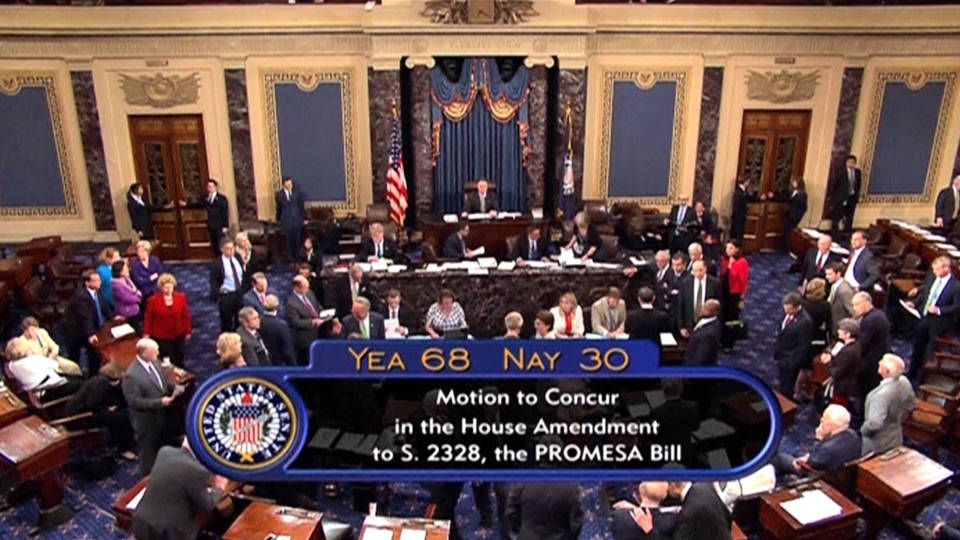
The U.S. Senate has passed the so-called PROMESA bill, which will establish a federally appointed control board with sweeping powers to run Puerto Rico’s economy. While the bill’s supporters say the bill will help the island cope with its crippling debt crisis, it has also been widely criticized as a means of removing democratic control from the citizens of Puerto Rico. The Senate’s 68-30 vote comes two days before Puerto Rico is expected to default on a more than $2 billion debt payment. New Jersey Senator Bob Menendez led the opposition to the bill.
Sen. Bob Menendez: "It is a vote to authorize an unelected, unchecked and all-powerful control board to determine Puerto Rico’s destiny for a generation or more. It is a bill to force Puerto Rico, without their say, to go $370 million further in debt to pay for this omnipotent control board, which they don’t even want. It is a vote to cut the minimum wage down to $4.25 per hour for young workers in Puerto Rico. It’s a vote to make Puerto Ricans work long overtime hours without fair compensation. It’s a vote to jeopardize collective bargaining agreements. It’s a vote to cut worker benefits and privatize inherently government functions. It’s a vote to close schools and shutter hospitals and cut senior citizens’ pensions to the bone. It’s a vote to put hedge funds ahead of the people. And it’s a vote to sell off and commercialize natural treasures that belong to the people of Puerto Rico."
Democratic presidential candidate and Vermont Senator Bernie Sanders also spoke out against the legislation.
Sen. Bernie Sanders: "This is a terrible piece of legislation, setting horrific precedent, and must not be passed. Mr. President, the United States of America should not treat Puerto Rico as a colony. We cannot and must not take away the democratic rights of the 3.5 million Americans of Puerto Rico and give virtually all power on that island to a seven-member board, which will be dominated, as it happens, by four Republicans."
Demonstrators have established an ongoing protest camp outside the U.S. Federal Court in Hato Rey, Puerto Rico, in opposition to the bill, which now heads to President Obama’s desk.
Turkey: Funerals Begin for 42 Victims of Airport Attack
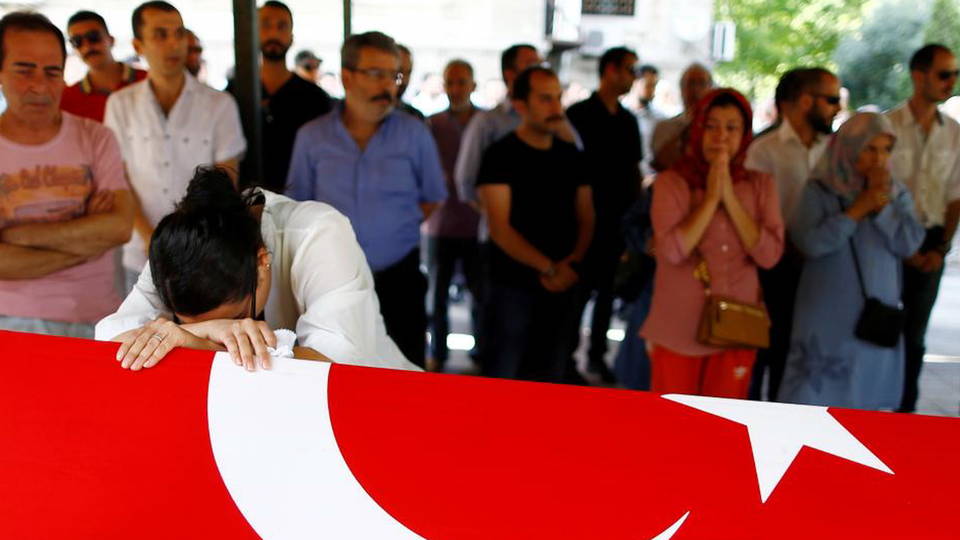
Turkey observed a day of mourning as funerals began for some of the 42 people who were killed in the triple suicide bombing and gun attack on Turkey’s main airport in Istanbul Tuesday. Turkish police say they have conducted more than a dozen raids across Istanbul, detaining 13 people in connection with the attack. Initial reports say the nationalities of the Istanbul airport attackers may have been Chechen, Uzbek and Kyrgyz, and that they may have spoken Russian. The attack also wounded more than 200 people, some of whom remain in critical condition. The sister of one of the wounded victims spoke out.
Emine Kulakaç: "While my brother was running to help, the first bomb exploded. My other brother told him to come back. He couldn’t come back. A bomb exploded. A boy was injured. Because the boy was in a pool of blood, my brother ran to help, and he was also injured. He is in critical condition. They can’t intervene, because he has shrapnel all over his body."
We’ll go to Istanbul after headlines.
Trump Rally: Talk Show Host Refers to Elizabeth Warren with War Whoops
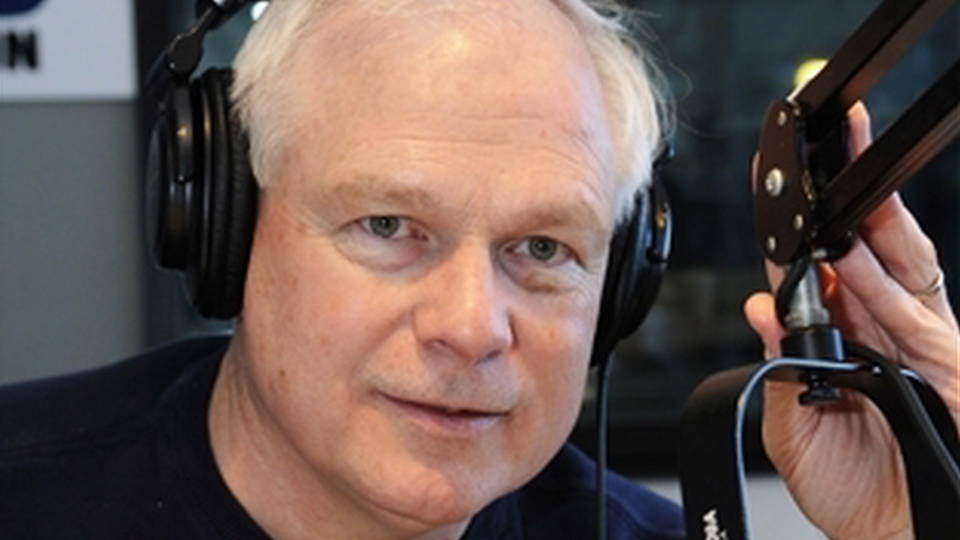
In news from the campaign trail, Republican presidential candidate Donald Trump held a rally in Maine, where he continued to criticize free trade deals. He appeared on stage alongside Maine Governor Paul LePage, who has faced intense criticism over his past racist comments, including claiming that African-American men come to his state as drug dealers and "impregnate a young, white girl before they leave." Another speaker at the rally was Howie Carr, a conservative Boston talk show host, who referred to Massachusetts Senator Elizabeth Warren by imitating Native American war whoops.
Howie Carr: "You know Elizabeth Warren, right? Whoop, whoop, whoop."
Imitating Native American war whoops is widely considered to be an offensive and ignorant gesture. This comes after Donald Trump has spent months calling Elizabeth Warren "Pocahontas" and "The Indian." Warren says her family is part Cherokee.
Neo-Nazis to Attend RNC to "Defend" Donald Trump Supporters
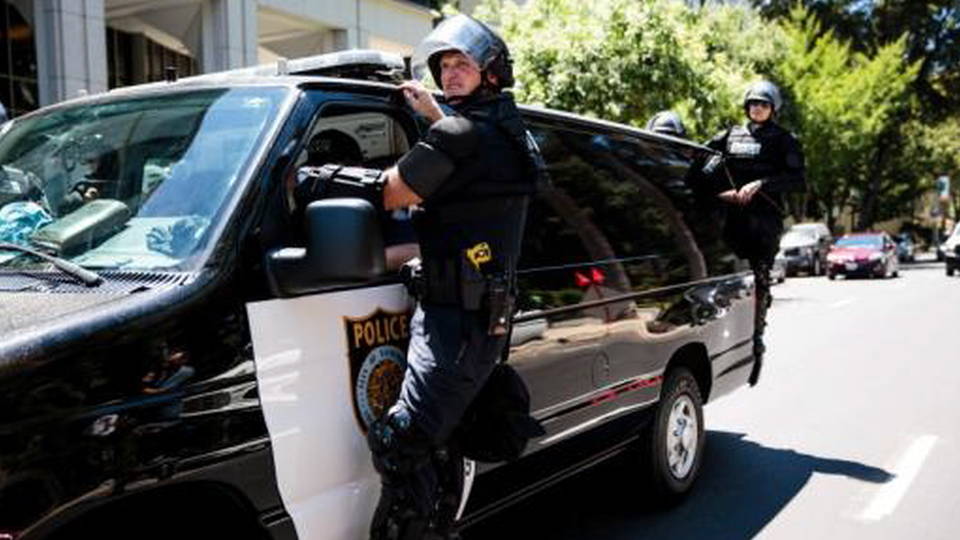
Cleveland and a federal judge have agreed on a new plan for protests during the Republican National Convention in July. The new guidelines will permit more time for demonstrations and a march route closer to downtown Cleveland. This comes after the ACLU sued Cleveland over its planned restrictions on free speech during the convention. Thousands of protesters are expected to travel to Cleveland—including the white nationalist group the Traditionalist Worker Party, which has confirmed it will be heading to the RNC to "make sure that the Donald Trump supporters are defended from the leftist thugs." The group held a neo-Nazi rally in Sacramento, California, where five people were stabbed on Sunday.
Afghanistan: 30 Police Officers Killed in Taliban Attack
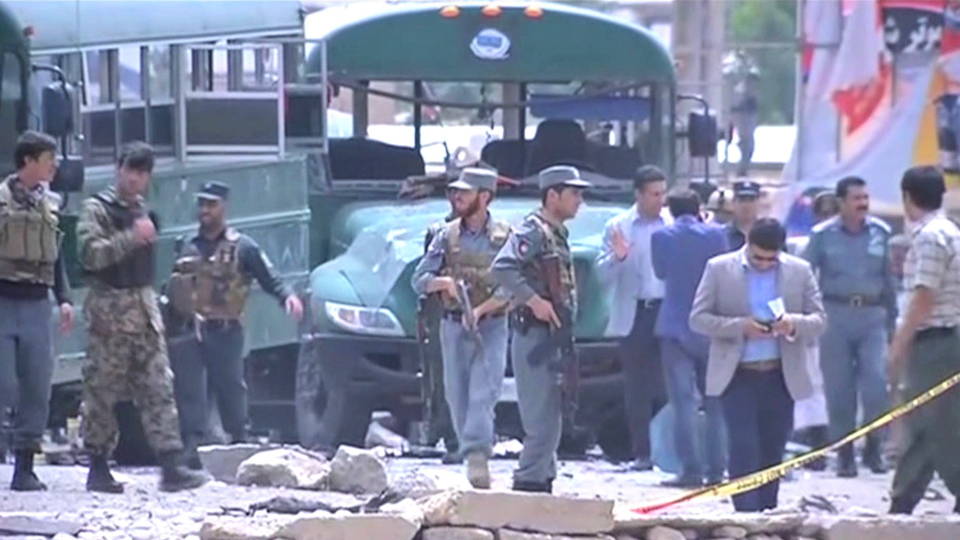
In Afghanistan, as many as 30 Afghan police officers have been killed after Taliban suicide bombers attacked a military convoy outside Kabul. This comes about two weeks after President Obama approved giving the U.S. military greater ability to conduct airstrikes and assist Afghan forces fighting the Taliban.
Report: U.S.-Led Airstrikes in Iraq Kill 250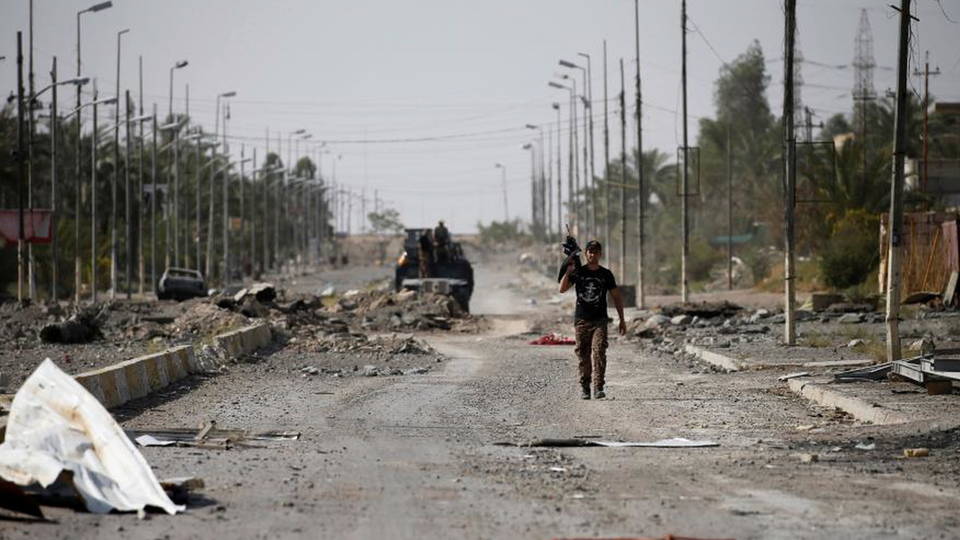
Meanwhile, in Iraq, unnamed U.S. officials have told Reuters that U.S.-led airstrikes have killed at least 250 people around the city of Fallujah. The officials said the victims are members of ISIS. This comes three days after Iraqi Prime Minister Haider al-Abadi says Iraq’s military—backed by U.S. airstrikes—retook control of the city of Fallujah, after it was captured by ISIS in 2014.
6 Honduran Police Indicted in U.S. on Drug Trafficking Charges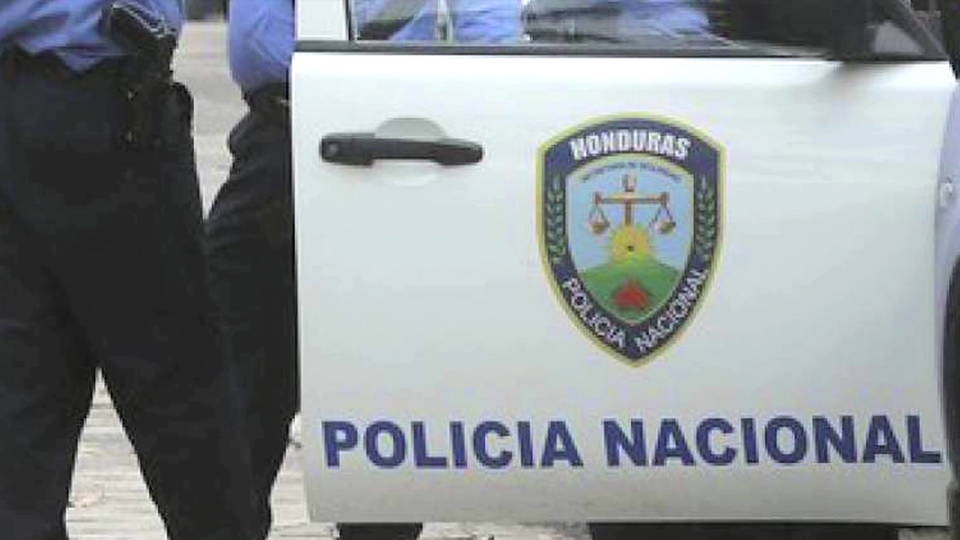
In news on Honduras, six National Police officers have been indicted in U.S. federal court on charges of conspiring to traffic cocaine into the U.S. The conspiracy allegedly involved the son of ex-Honduran President Porfirio Lobo, who took power after the U.S.-backed coup in 2009. The indictments come amid mounting scrutiny of the Honduran security forces, following allegations by a former Honduran soldier that murdered environmentalist Berta Cáceres appeared on a hit list distributed to U.S.-trained special forces before her assassination. Georgia Representative Hank Johnson has introduced a new bill to stop all U.S. military funding to Honduras.
Denver: Woman Killed by Estranged Husband at Alliance Center
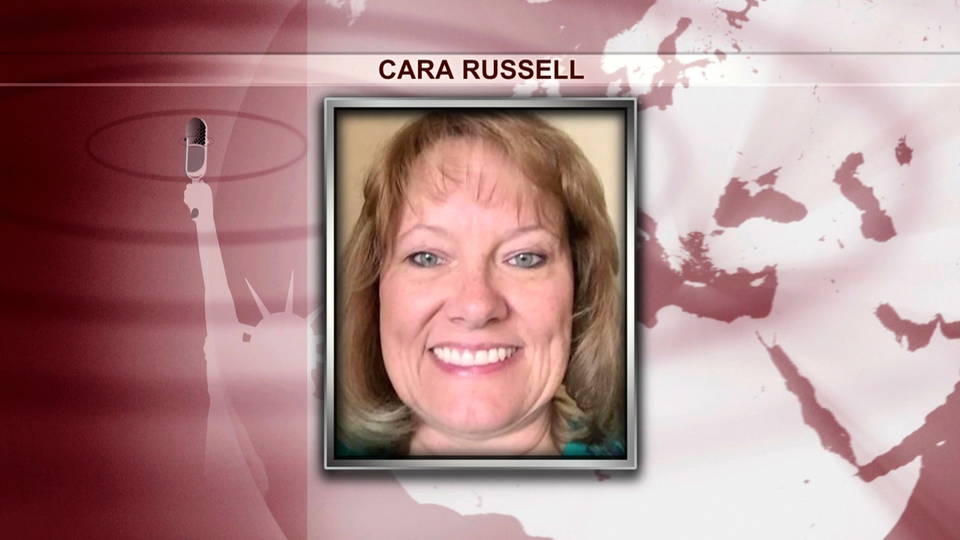
In Denver, a woman has been fatally shot inside The Alliance Center by her estranged husband. Fifty-three-year-old Cara Russell was the executive director of the Colorado Association for Recycling and the former mayor of Buena Vista, Colorado. She had a restraining order and had recently filed for divorce. Her ex-husband walked into The Alliance Center with a handgun on Tuesday and shot her, before killing himself. She died later in the hospital. Her murder comes after the massacre of 49 people in Orlando by Omar Mateen, who also had a history of domestic violence.
FBI Seeks to Withhold Public Records on Orlando Massacre
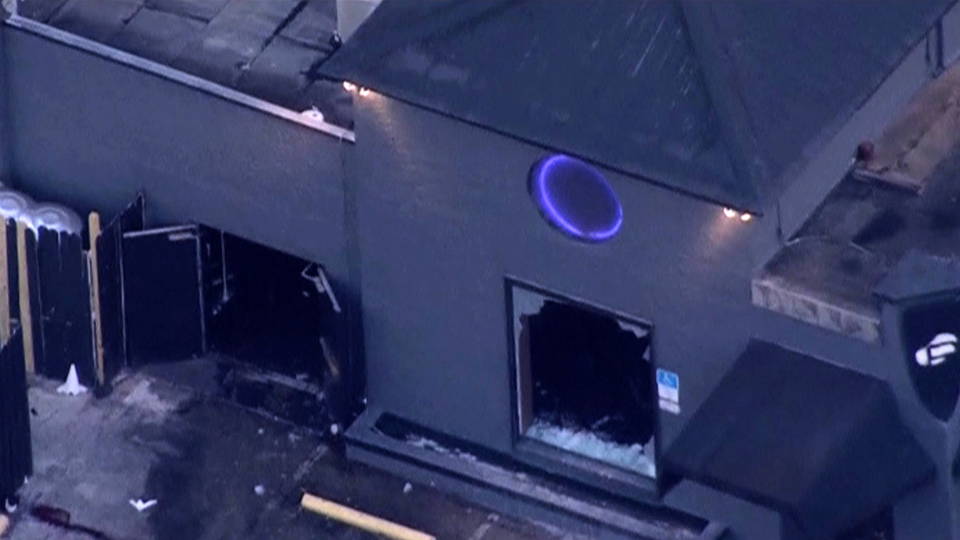
Meanwhile, the Orlando Sentinel is reporting that the FBI has asked law enforcement agencies to withhold public records in the wake of the Pulse nightclub massacre. In a June 20 letter, the FBI asks other law enforcement agencies to "immediately notify the FBI of any requests your agency received [so] the FBI can seek to prevent disclosure through appropriate channels, as necessary." More than two dozen media outlets, including the Orlando Sentinel, have requested public documents, and a federal lawsuit has been launched to demand their release.
Two Trans Women Become First to Win Major-Party Congressional Primaries
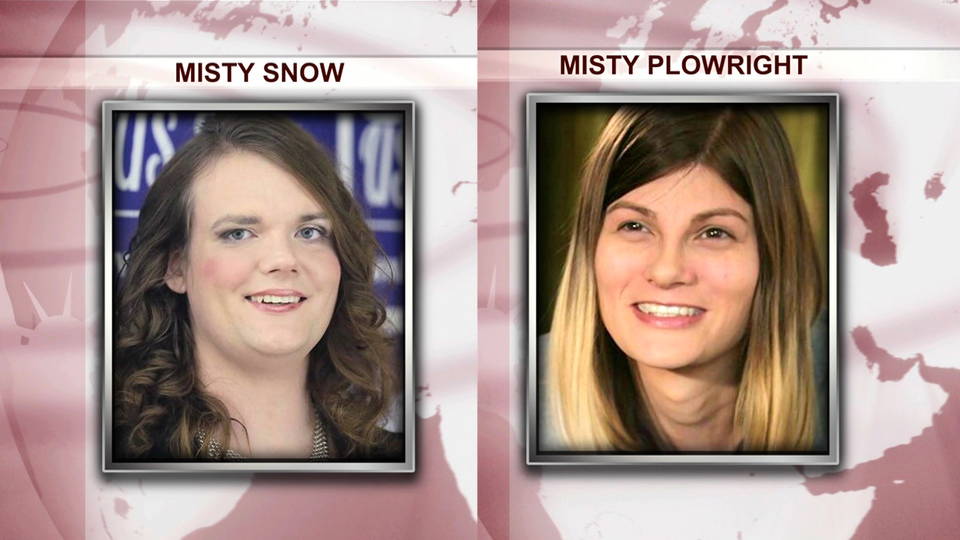
Two transgender women have been nominated by Democratic primary voters in Utah and Colorado to challenge Republican incumbents for their congressional seats in November. Thirty-year-old Misty Snow of Utah and 33-year-old Misty Plowright of Colorado are the nation’s first openly transgender candidates to win a major-party congressional primary in U.S. history.
23 Activists Arrested Protesting Spectra Pipeline in West Roxbury, MA
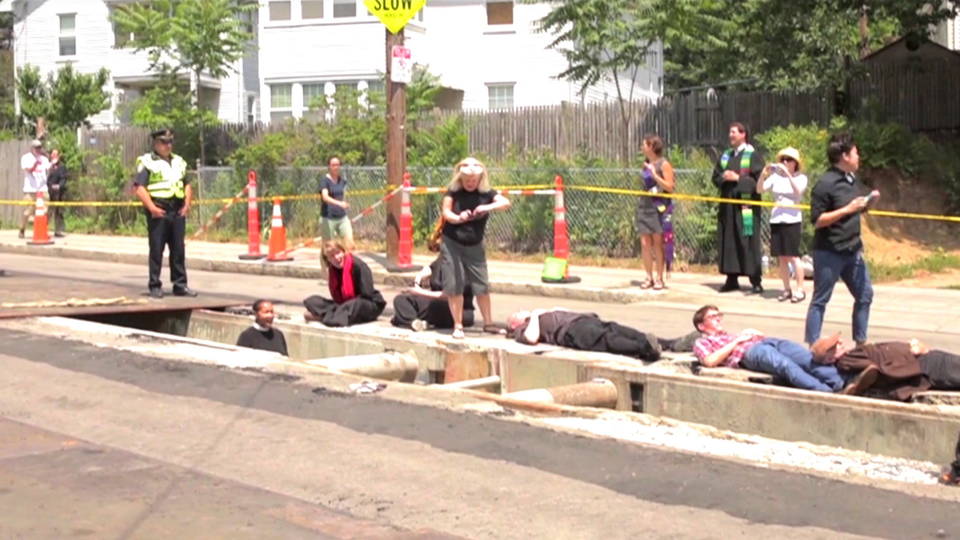
In West Roxbury, Massachusetts, 23 activists were arrested protesting the construction of a Spectra Energy gas pipeline. Among those arrested were Karenna Gore, the daughter of former Vice President Al Gore, and Tim DeChristopher, who spent close to two years in prison when he posed as a bidder at an oil and gas auction in Utah. The protesters lay down in the trenches of the Spectra pipeline—drawing a comparison to the mass graves dug in Pakistan in anticipation of a climate-fueled heat wave in May. Tim DeChristopher spoke out.
Tim DeChristopher: "This is not just a pipeline trench. What they are digging is a mass grave, because in this age of anticipatory mass graves, we know that every new fossil fuel development that commits us to burning fossil fuels for decades, when we put in this infrastructure, we know that every new fossil fuel infrastructure will lead to another mass grave somewhere in the world."
Tim DeChristopher and Karenna Gore will join us from Boston, before their arraignment, later in the broadcast.
Philadelphia: 5 Arrested Blocking Highway Demanding End to Deportation
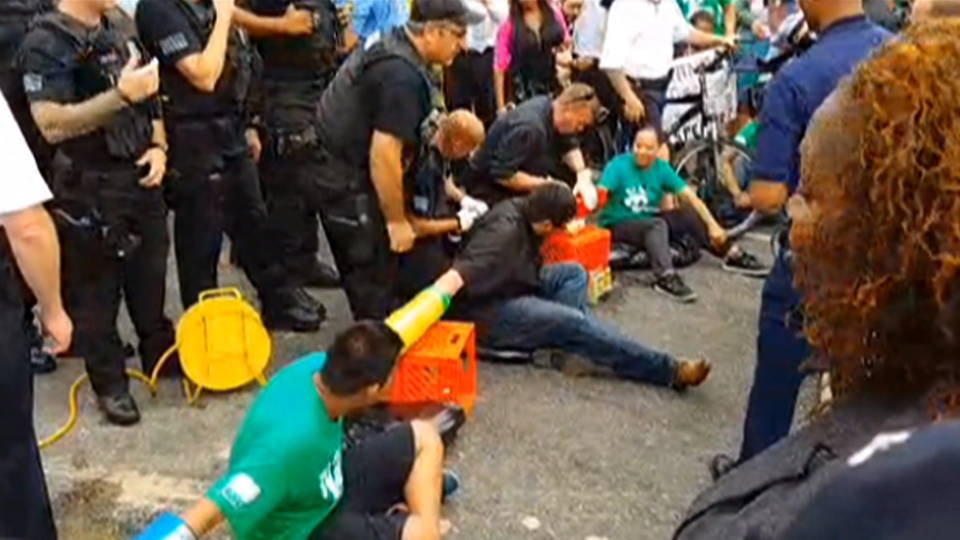
And protests continue in the wake of the divided Supreme Court ruling that blocked the Obama administration’s DAPA program, which would have shielded up to 5 million people from deportation. In Philadelphia, five people were arrested Tuesday for blocking the off-ramp to Interstate 676 by locking themselves together using PVCpipes. Among those arrested was 13-year-old Erick Perez-Hernandez, a U.S. citizen whose parents would have been eligible for DAPA. Ahead of the action, he said of the ruling, "It is unfair, wrong, and now I have to wonder if my sister and I have to worry about being ripped away from our parents."
Donate today:
Follow:



SPEAKING EVENTS

The U.S. Senate has passed the so-called PROMESA bill, which will establish a federally appointed control board with sweeping powers to run Puerto Rico’s economy. While the bill’s supporters say the bill will help the island cope with its crippling debt crisis, it has also been widely criticized as a means of removing democratic control from the citizens of Puerto Rico. The Senate’s 68-30 vote comes two days before Puerto Rico is expected to default on a more than $2 billion debt payment. New Jersey Senator Bob Menendez led the opposition to the bill.
Sen. Bob Menendez: "It is a vote to authorize an unelected, unchecked and all-powerful control board to determine Puerto Rico’s destiny for a generation or more. It is a bill to force Puerto Rico, without their say, to go $370 million further in debt to pay for this omnipotent control board, which they don’t even want. It is a vote to cut the minimum wage down to $4.25 per hour for young workers in Puerto Rico. It’s a vote to make Puerto Ricans work long overtime hours without fair compensation. It’s a vote to jeopardize collective bargaining agreements. It’s a vote to cut worker benefits and privatize inherently government functions. It’s a vote to close schools and shutter hospitals and cut senior citizens’ pensions to the bone. It’s a vote to put hedge funds ahead of the people. And it’s a vote to sell off and commercialize natural treasures that belong to the people of Puerto Rico."
Democratic presidential candidate and Vermont Senator Bernie Sanders also spoke out against the legislation.
Sen. Bernie Sanders: "This is a terrible piece of legislation, setting horrific precedent, and must not be passed. Mr. President, the United States of America should not treat Puerto Rico as a colony. We cannot and must not take away the democratic rights of the 3.5 million Americans of Puerto Rico and give virtually all power on that island to a seven-member board, which will be dominated, as it happens, by four Republicans."
Demonstrators have established an ongoing protest camp outside the U.S. Federal Court in Hato Rey, Puerto Rico, in opposition to the bill, which now heads to President Obama’s desk.
Turkey: Funerals Begin for 42 Victims of Airport Attack

Turkey observed a day of mourning as funerals began for some of the 42 people who were killed in the triple suicide bombing and gun attack on Turkey’s main airport in Istanbul Tuesday. Turkish police say they have conducted more than a dozen raids across Istanbul, detaining 13 people in connection with the attack. Initial reports say the nationalities of the Istanbul airport attackers may have been Chechen, Uzbek and Kyrgyz, and that they may have spoken Russian. The attack also wounded more than 200 people, some of whom remain in critical condition. The sister of one of the wounded victims spoke out.
Emine Kulakaç: "While my brother was running to help, the first bomb exploded. My other brother told him to come back. He couldn’t come back. A bomb exploded. A boy was injured. Because the boy was in a pool of blood, my brother ran to help, and he was also injured. He is in critical condition. They can’t intervene, because he has shrapnel all over his body."
We’ll go to Istanbul after headlines.
Trump Rally: Talk Show Host Refers to Elizabeth Warren with War Whoops

In news from the campaign trail, Republican presidential candidate Donald Trump held a rally in Maine, where he continued to criticize free trade deals. He appeared on stage alongside Maine Governor Paul LePage, who has faced intense criticism over his past racist comments, including claiming that African-American men come to his state as drug dealers and "impregnate a young, white girl before they leave." Another speaker at the rally was Howie Carr, a conservative Boston talk show host, who referred to Massachusetts Senator Elizabeth Warren by imitating Native American war whoops.
Howie Carr: "You know Elizabeth Warren, right? Whoop, whoop, whoop."
Imitating Native American war whoops is widely considered to be an offensive and ignorant gesture. This comes after Donald Trump has spent months calling Elizabeth Warren "Pocahontas" and "The Indian." Warren says her family is part Cherokee.
Neo-Nazis to Attend RNC to "Defend" Donald Trump Supporters

Cleveland and a federal judge have agreed on a new plan for protests during the Republican National Convention in July. The new guidelines will permit more time for demonstrations and a march route closer to downtown Cleveland. This comes after the ACLU sued Cleveland over its planned restrictions on free speech during the convention. Thousands of protesters are expected to travel to Cleveland—including the white nationalist group the Traditionalist Worker Party, which has confirmed it will be heading to the RNC to "make sure that the Donald Trump supporters are defended from the leftist thugs." The group held a neo-Nazi rally in Sacramento, California, where five people were stabbed on Sunday.
Afghanistan: 30 Police Officers Killed in Taliban Attack

In Afghanistan, as many as 30 Afghan police officers have been killed after Taliban suicide bombers attacked a military convoy outside Kabul. This comes about two weeks after President Obama approved giving the U.S. military greater ability to conduct airstrikes and assist Afghan forces fighting the Taliban.
Report: U.S.-Led Airstrikes in Iraq Kill 250

Meanwhile, in Iraq, unnamed U.S. officials have told Reuters that U.S.-led airstrikes have killed at least 250 people around the city of Fallujah. The officials said the victims are members of ISIS. This comes three days after Iraqi Prime Minister Haider al-Abadi says Iraq’s military—backed by U.S. airstrikes—retook control of the city of Fallujah, after it was captured by ISIS in 2014.
6 Honduran Police Indicted in U.S. on Drug Trafficking Charges

In news on Honduras, six National Police officers have been indicted in U.S. federal court on charges of conspiring to traffic cocaine into the U.S. The conspiracy allegedly involved the son of ex-Honduran President Porfirio Lobo, who took power after the U.S.-backed coup in 2009. The indictments come amid mounting scrutiny of the Honduran security forces, following allegations by a former Honduran soldier that murdered environmentalist Berta Cáceres appeared on a hit list distributed to U.S.-trained special forces before her assassination. Georgia Representative Hank Johnson has introduced a new bill to stop all U.S. military funding to Honduras.
Denver: Woman Killed by Estranged Husband at Alliance Center

In Denver, a woman has been fatally shot inside The Alliance Center by her estranged husband. Fifty-three-year-old Cara Russell was the executive director of the Colorado Association for Recycling and the former mayor of Buena Vista, Colorado. She had a restraining order and had recently filed for divorce. Her ex-husband walked into The Alliance Center with a handgun on Tuesday and shot her, before killing himself. She died later in the hospital. Her murder comes after the massacre of 49 people in Orlando by Omar Mateen, who also had a history of domestic violence.
FBI Seeks to Withhold Public Records on Orlando Massacre

Meanwhile, the Orlando Sentinel is reporting that the FBI has asked law enforcement agencies to withhold public records in the wake of the Pulse nightclub massacre. In a June 20 letter, the FBI asks other law enforcement agencies to "immediately notify the FBI of any requests your agency received [so] the FBI can seek to prevent disclosure through appropriate channels, as necessary." More than two dozen media outlets, including the Orlando Sentinel, have requested public documents, and a federal lawsuit has been launched to demand their release.
Two Trans Women Become First to Win Major-Party Congressional Primaries

Two transgender women have been nominated by Democratic primary voters in Utah and Colorado to challenge Republican incumbents for their congressional seats in November. Thirty-year-old Misty Snow of Utah and 33-year-old Misty Plowright of Colorado are the nation’s first openly transgender candidates to win a major-party congressional primary in U.S. history.
23 Activists Arrested Protesting Spectra Pipeline in West Roxbury, MA

In West Roxbury, Massachusetts, 23 activists were arrested protesting the construction of a Spectra Energy gas pipeline. Among those arrested were Karenna Gore, the daughter of former Vice President Al Gore, and Tim DeChristopher, who spent close to two years in prison when he posed as a bidder at an oil and gas auction in Utah. The protesters lay down in the trenches of the Spectra pipeline—drawing a comparison to the mass graves dug in Pakistan in anticipation of a climate-fueled heat wave in May. Tim DeChristopher spoke out.
Tim DeChristopher: "This is not just a pipeline trench. What they are digging is a mass grave, because in this age of anticipatory mass graves, we know that every new fossil fuel development that commits us to burning fossil fuels for decades, when we put in this infrastructure, we know that every new fossil fuel infrastructure will lead to another mass grave somewhere in the world."
Tim DeChristopher and Karenna Gore will join us from Boston, before their arraignment, later in the broadcast.
Philadelphia: 5 Arrested Blocking Highway Demanding End to Deportation

And protests continue in the wake of the divided Supreme Court ruling that blocked the Obama administration’s DAPA program, which would have shielded up to 5 million people from deportation. In Philadelphia, five people were arrested Tuesday for blocking the off-ramp to Interstate 676 by locking themselves together using PVCpipes. Among those arrested was 13-year-old Erick Perez-Hernandez, a U.S. citizen whose parents would have been eligible for DAPA. Ahead of the action, he said of the ruling, "It is unfair, wrong, and now I have to wonder if my sister and I have to worry about being ripped away from our parents."
Donate today:
Follow:




SPEAKING EVENTS

Sotomayor "Tells It Like It Is" & Slams Racial Profiling, Illegal Search and Seizure in Scathing Dissent
WORK WITH DN!

"The Supreme Court Makes Herstory" by Amy Goodman & Denis Moynihan
Her story was made this week. The U.S. Supreme Court settled a major battle over women’s reproductive rights, overturning Texas’s notorious anti-abortion law known as HB 2. The court’s 5-3 decision in Whole Woman’s Health v. Hellerstedt ruled that the Texas law violated the right of women to abortion access. HB 2 is one of scores of so-called TRAP laws that have proliferated around the country. “TRAP” stands for “Targeted Regulation of Abortion Providers.” These laws are designed to close clinics by forcing them to make expensive renovations to their facilities, or requiring doctors to have admitting privileges to hospitals. TRAP laws inevitably lead to clinics closing down. Whole Woman’s Health runs several clinics that provide abortion services in Texas, and decided to sue the state to challenge the law.
This significant legal victory was obtained not only in the chambers of the three women Supreme Court justices, Ruth Bader Ginsburg, Elena Kagan and Sonia Sotomayor, and their two male allies, Stephen Breyer and Anthony Kennedy. It was won through years of organizing at the grass-roots, in the media and in the halls of the Texas Legislature.
The law was passed in July 2013, amidst unprecedented controversy. On June 25, in the final day of a special session, the Texas Senate was slated to consider the bill. State Sen. Wendy Davis, a Fort Worth Democrat, donned comfortable pink running shoes and took the floor after 11 a.m. She began a filibuster, hoping to speak until midnight, when state law would compel the special session to end. Unlike in the U.S. Senate, in Texas, the senator must continue standing and speaking, alone. Even in the U.S. Senate, when a senator chooses to engage in the theatrical in-person filibuster, as Sen. Chris Murphy did recently after the Orlando massacre, the senator can get a respite when colleagues ask long, speechlike questions. But Wendy Davis spoke herself, nonstop, through the day, on topic. She could not spend time on unrelated topics, as Sen. Ted Cruz did during his filibuster in the U.S. Senate when he read Dr. Seuss’ “Green Eggs and Ham” to fill time. The internet live stream of Davis’ filibuster went viral. Thousands flocked to the Texas Statehouse in solidarity.
The Republican majority in the Texas Senate managed to rule Davis procedurally out of order at 10 p.m., thereby giving the senators a full two hours before midnight to pass HB 2. But by that time, thousands of people clogging the Capitol began chanting, “Hell no, we won’t go!” The noise was so disruptive that the Senate was prevented from holding a roll call. A people’s filibuster prevailed. Two weeks later, then-Gov. Rick Perry called another special legislative session, and the bill was passed.
Justice Stephen Breyer, in the court’s majority opinion striking down HB 2, wrote, “[A]bortions taking place in an abortion facility are safe—indeed, safer than numerous procedures that take place outside hospitals and to which Texas does not apply its surgical-center requirements. ... Nationwide, childbirth is 14 times more likely than abortion to result in death, but Texas law allows a midwife to oversee childbirth in the patient’s own home.” Breyer also noted that a colonoscopy, a procedure that typically takes place outside a hospital setting, has a mortality rate 10 times higher than an abortion. The mortality rate for liposuction is 28 times higher than abortion.
Stephanie Toti, 37, argued the case on behalf of Whole Woman’s Health. She is a senior counsel at the Center for Reproductive Rights. When we asked her on “Democracy Now!” what it was like, both as a woman and as a first-timer before the Supreme Court, Stephanie Toti said: “The plaintiffs in this case, I think, felt strongly that they would like me to represent them in court. And I think it was meaningful to a lot of people to have a woman of reproductive age there at the court arguing this case.”
From the plaintiff, Amy Hagstrom Miller, founder and CEO of Whole Woman’s Health, who has been providing abortion care since 1989, to Stephanie Toti of the Center for Reproductive Rights, which has been representing women for almost a quarter-century, to the three women Supreme Court justices, an unprecedented number on the high court: movements matter. The struggle for women’s rights has been waged for generations. With hundreds of anti-choice bills around the country, this landmark victory is cause for celebration, but not rest. As Amy Hagstrom Miller said in front of the Supreme Court, “A win doesn’t mean the struggle is over.”
207 West 25th Street, 11th Floor
New York, New York 10001, United States
---------------------
---------------------



No comments:
Post a Comment